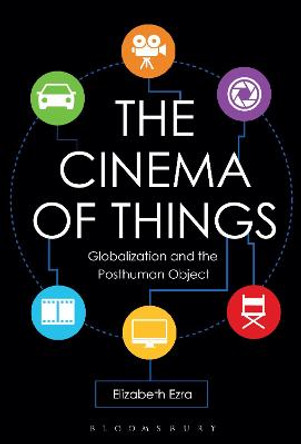Description
Traces the progressive redrawing of the boundaries between human beings and things as represented in cinema through commodity culture, objectification, and technological supplementation.
About the Author
Elizabeth Ezra is Professor of Cinema and Culture at the University of Stirling in Scotland. Major publications include: The Colonial Unconscious (2000); Georges Melies: The Birth of the Auteur (2000); Jean-Pierre Jeunet (2008); European Cinema (2004); and Transnational Cinema: The Film Reader (2006) as well as numerous contributions to scholarly journals including Screen and Yale French Studies. Current work includes projects on screen tests and on the posthuman in children's literature and cinema.
Reviews
Compelling at every turn, The Cinema of Things shows how the character of posthuman condition in which we live owes much to the seventh art. From Melies to Andrew Stanton, or Feuillade to Ridley Scott, cinema cheerfully turns human subjects into prosthetic devices, disposable commodities, or useless waste. In dazzling readings of classical and contemporary features, Ezra discerns the unspoken or disavowed dimensions of films that range from the Marx Brothers to Avatar. The book counts among the most powerful, courageously written, and urgently needed studies of cinema over the last decade. * Tom Conley, Lowell Professor, Departments of Visual & Environmental Studies and Romance Languages, Harvard University, USA *
From the end of the nineteenth century to the first decade of the twenty first century, from the beginnings of the medium to the cinema of globalization and blockbusters, Elisabeth Ezra's ambitious project takes us on a captivating exploration of the increasingly blurred frontiers between the human and the non-human. Hers is an illuminating, topical and witty examination of that which the cinema as a machine-based art form, as well as a cultural and economic phenomenon, uniquely mediates: the relationship between the human and objects. Theoretically informed and critically engaged, and drawing examples from a wide-ranging, and historically contextualized corpus of French and American films, Ezra's book addresses patterns of consumption and waste, desire and objectification that cinema simultaneously reflects and sets in motion. Ultimately, the conundrum that never ceases to preoccupy film makers, and that Ezra so convincingly unravels, is the key question of our technology-obsessed time: what is it, in a world that is increasingly filled with things and run by machines, that makes us human? * Martine Beugnet, Professor in Visual Studies, University of Paris 7 Diderot, France and author of Cinema and Sensation *
This book is a tour de force of imaginative thinking about the relationship between humans and objects, and the multiple ways in which the cinema represents the complex intersections of the human, objects and technology. One of the most appealing aspects of the book is seeing the connections Elizabeth Ezra makes across a range of very different film texts from different eras, national cinemas, formal traditions and production contexts. One has complete confidence in the her mastery of film history and theoretical scholarship, and cannot fail to be impressed by the ease with which she reads contemporary popular cinema within a continuum that extends as far back as the first silent films. it is a topical, smart and genuinely exciting book that sets new agendas in our thinking about how humans engage with life beyond the self in the global age. * Sue Harris, Professor of Film Studies, School of Languages, Linguistics & Film, Queen Mary University of London, UK *
A genuinely complete film scholar, Elizabeth Ezra animates "objects" with her dynamic interpretations of works across cinema's full history, from Melies to Spike Jonze, and from France to the globe. In her hands, Latour, Deleuze, Stiegler, Doane, Chion, and other difficult theorists become limpid, because of their obvious pertinence to the great topic of this book: the pathos of things, as they are inscribed in that partly-human machine we call the cinema. * Dudley Andrew, R. Selden Rose Professor of Comparative Literature and Film Studies, Yale University, USA and author of What Cinema Is! *
Expertly charts the gradual reshaping of once-established borders that exist between people and things ... the book is boldly imaginative, with Ezra bringing a depth of contemporary and historical cinematic knowledge to tease out the shifting tension between humans and things. The text helps the reader to think through how cinema provides a space to deconstruct the interaction of people and otherness, both in a globalised and a simulated future world. * Alphaville *
Book Information
ISBN 9781501328855
Author Elizabeth Ezra
Format Hardback
Page Count 216
Imprint Bloomsbury Academic USA
Publisher Bloomsbury Publishing Plc
Weight(grams) 463g










